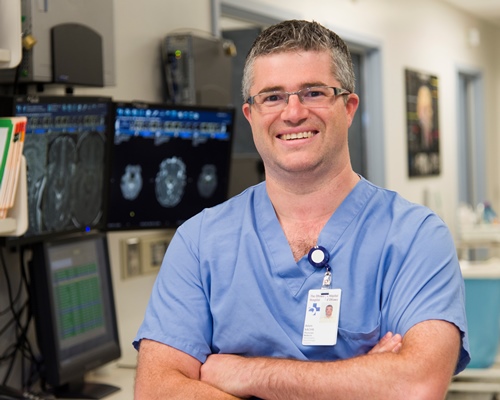 “If it works, this kind of technology could one day allow people with spinal cord injuries or ALS to control a robotic arm, a wheelchair or a communications device just by thinking,” said Dr. Adam Sachs.Researchers at The Ottawa Hospital and the University of Ottawa are launching a world-first clinical trial that could lead to a new kind of brain computer interface, paving the way for advanced technologies to help people with paralysis.
“If it works, this kind of technology could one day allow people with spinal cord injuries or ALS to control a robotic arm, a wheelchair or a communications device just by thinking,” said Dr. Adam Sachs.Researchers at The Ottawa Hospital and the University of Ottawa are launching a world-first clinical trial that could lead to a new kind of brain computer interface, paving the way for advanced technologies to help people with paralysis.
The trial is led by Dr. Adam Sachs, Head of Integrated Spine Surgery and Director of Neuromodulation and Functional Neurosurgery at The Ottawa Hospital.
“Our goal is to connect the human brain to a computer and help the computer learn how to decode brain signals,” said Dr. Sachs, who is also an associate professor with the University of Ottawa Brain and Mind Research Institute and an adjunct professor of computer engineering at Carleton University. “If it works, this kind of technology could one day allow people with spinal cord injuries or ALS to control a robotic arm, a wheelchair or a communications device just by thinking.”
Over the last 20 years, research groups around the world have made important progress in developing brain computer interfaces, but more research is needed before this technology can be widely used.
Dr. Sachs and his team believe their unique approach, which involves connecting an implant to both the brain’s pre-frontal cortex and the motor cortex, will make a difference. Previous studies have focused on the motor cortex.
“The lateral prefrontal cortex contains cognitive signals such as attention, preference, and working memory,” said Dr. Sachs. “Our approach is to include these signals to develop a more user-friendly cognitive brain computer interface.”
Dr. Sachs was involved in similar studies at Stanford University about a decade ago. Since coming to Ottawa, he has established collaborations with a world-class team with expertise in artificial intelligence, engineering, physics, neurosurgery and ethics to continue the work.
The team has developed innovative technologies and algorithms that they hope to test and optimize in the trial. Now they are looking for local individuals with spinal cord injury or ALS to participate. Specifically, they are looking for people with upper body disabilities who are otherwise healthy, and who are willing to be part of the research team for at least eight months.
“Ideal study participants might be interested in science and engineering, in the idea of advancing knowledge, or just in helping others with spinal cord injury,” said Dr. Sachs. “There is a time commitment, of course. But ultimately, we would love to hear from people who enjoy learning about new technologies and therapies. That’s a great fit for this kind of study.”
People who may be interested in participating can view this pamphlet and contact Nella Bianconi at 613-863-8225 or nbianconi@ohri.ca for more information. Additional information about the trial is also available on clinicaltrials.gov.
This initial study, sponsored by the Ottawa Hospital Research Institute, will involve surgically implanting tiny electrodes into the brain and removing them at the end of the study. Future research will investigate wireless solutions.
Dr. Sachs’ research program has been supported by the Canada Foundation for Innovation, the University of Ottawa Brain and Mind Research Institute, the University of Ottawa Department of Surgery and Division of Neurosurgery, the Parkinson Research Consortium and The Ottawa Hospital Foundation.
Dr. Sachs' collaborators include Drs. Jean-Claude Béïque, Richard Naud, Maia Fraser, Jennifer Chandler, Katalin Tóth and Julio Martinez-Trujillo.
The Ottawa Hospital is a leading academic health, research and learning hospital proudly affiliated with the University of Ottawa.
Media Contact
Jenn Ganton
jganton@ohri.ca
613-614-5253
